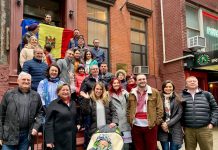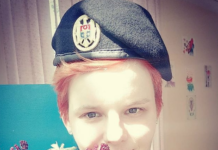
The horror stories lived by young Moldovan girls and boys reflect the traumas of a society on the verge of collapse. The first time it happened Karina was 9 years old. She was naked, getting dressed in her room after taking a bath, according to The Daily Beast publication.
The door opened and her drunken father burst in, pushing her, touching her, whispering: “If you tell anyone, I will kill you.” She did not even understand what was going on, except that her father was violent, again. When the mother returned home from a hospital, where she received antibiotic treatment for tuberculosis, she asked her husband why his pants were unzipped and the girl was naked, crying in her bed. The drunken father pretended he had no idea.
As she talked, Karina’s fingers constantly toyed with pieces of plastic and little threads sticking out of her bead bracelets she’d made for herself. She is now 14 years old, looking back on a life that seemed like an eternity of torture.
“I learned to keep the secret, to stay silent about him raping me,” she said. “Every time he did, he was very drunk and I cried, asking him to stop; but my mother was drunk and could not hear him. My father was big and often beat my mother bloody in front of me and my two brothers and my older sister,” Karina told The Daily Beast in a crisis shelter.
Police and social workers hear such stories in many countries around the world, but here in Moldova they are especially common, reflecting conditions in a society on the verge of collapse where abuse is common inside families, and, outside, human trafficking has become common.
Karina’s psychologist, Lidia Gorceag, tells us, “Her father was not a pedophile, he was a ruin, an example of ultimately degraded personality.” Karina was in her third week at the crisis center, working on her gymnastics and acrobatic jumps, and on writing poetry when she was not studying in school.
Sometimes Karina’s mother saw her husband raping their daughter, but did not call for police. Neither did the relatives, nor Karina’s teachers at the institution for children of parents sick with tuberculosis.
Karina’s eyes filled up with tears. A woman had volunteered to give her foster care, but one of her teachers told her “that I was worse than any other kid because I had slept with my father.” Last year Karina’s father finally was convicted and sentenced to 18 years in prison.
One of the other girls is a 13-year-old who told The Daily Beast she needed shelter, “Because I saw how my grandfather baked my grandmother alive in the stove; and then he took an ax and broke my mother’s skull.” Her mother, she said, has become schizophrenic as a result of her trauma.
Moldovan social workers say that such kids are easy prey for human traffickers, and the statistics bear them out. Moldova is among the countries with the highest incidence of human trafficking in Europe.
Since 2000, the International Organization for Migration (IOM) mission in Moldova has assisted 3,244 victims of domestic violence and human sex traffic both local and foreign citizens. There were years when dozens of young women arrived back home, after long days and nights living as sex slaves in Europe, Turkey or the Middle East, sometimes without seeing their own children for years.
“I am currently assisting two women, age 42 and 39, who lived slaving for gypsies in the Moscow region for 11 years, being used as professional beggars or pushing wheelchairs with disabled people, asking for money in the streets,” said Gorceag, the psychologist at the center. “They often did not have enough to eat, they were cold, they were rarely paid money. But they originally went to Russia, because traffickers promised them good jobs.”
In 2015 the IOM in Moldova assisted 44 sexually exploited victims of human trafficking. In the last couple of years, the Chisinau crises center staff began to notice that the second generation of victims, children of once-exploited women, now came for help with their own troubles. “Many children, nearly every third child in Moldova, grows up without their parents, as parents go abroad to find jobs,” said Irina Arap, an IOM repatriation specialist.
Gorceag has worked at the crises shelter supported by IOM since the day it opened 15 years ago. That was a time of economic crises. Factories closed down, there were no jobs in Moldova, and a vast exodus began of young women looking for any opportunity to make money in Western Europe, Turkey, and the Middle East. Some people were so desperate that they were ready to sell their organs.
Up to half a million of Moldova’s 3.6 million citizens are working in Russia, but the economic crisis there has caused migrants’ wages to go down by more than 30 percent. Over 800,000 Moldavians worked abroad, globally, competing with millions of migrants from Africa and the Middle East who are willing to risk their health and lives.
In 1999, Gheorghi Ungureanu sold his kidney for $3,000. Ungureanu believed that traffickers would find him a job in Israel, but instead, he ended up in Turkey, where his kidney was removed for what he later realized was a miserable price.
“In 2001 we were dealing with the most complicated versions and routes of sex traffic and the human organ trade,” Gorceag recalled. “There were days when charter planes brought up to 25 victims back to Chisinau; many of them had not seen their kids for years. So we provided them with a shelter.” Even so, some of her patients suffered dramatic breakdowns, requiring extensive psychiatric help.
 Today, Moldova has a law against human trafficking, but the agents exploiting men and women have found plenty of loopholes. “Traffickers are always one step ahead of us,” the Gorceag told The Daily Beast. Moldovan girls as young as 14 are being exploited as sex slaves, forced to have sex with 12 to 15 men a night.
Today, Moldova has a law against human trafficking, but the agents exploiting men and women have found plenty of loopholes. “Traffickers are always one step ahead of us,” the Gorceag told The Daily Beast. Moldovan girls as young as 14 are being exploited as sex slaves, forced to have sex with 12 to 15 men a night.
Karina’s life could be different. But there is little funding to support her care. In the past few weeks, the state purchased clothes for her. But it is preparing to send Karina to a permanent orphanage in a poor and remote southern region of Moldova.
“Unfortunately, we cannot keep Karina here and continue to help her develop her talents,” said Gorceag. “The state ran out of funding, so the entire new building for child victims stands ready, but there is no money to open it.”
What will become of the girl?
“She is so traumatized, she is a potential target for traffickers,” said Gorceag, almost as if such a fate is inevitable. That is not Karina’s vision of her future. She says she wants to become a cosmetologist. She wants to write poems. In the meantime, she keeps a diary. On one page she has written, “I have never experienced parental love.”
source: The Daily Beast



















